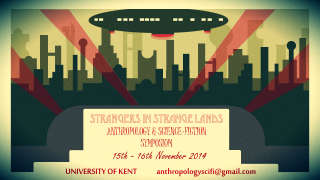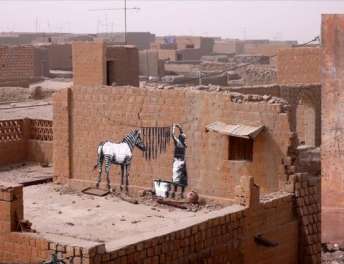Over the past year one of Allegra’s recurring features has become its Events posts – designed to give you glimpses into the most exciting forthcoming events of our beloved discipline. This forthcoming fall seems as no deviation from the norm, as its offerings are diverse and engaging. For some of these calls for papers have already closed, but we wanted to include them anyway to meet all your spontaneous Conference Attendance Urges. As always, please ENJOY & DO send us your conference notes & papers! And remember: CONTACT US if you’re organising an event that you think Allegra should feature; EMAIL: allegralab@gmail.com (And as this featured image shows, we remain in festive mood due to Allegra’s 1st birthday!)
Conferences with Open Calls for Papers:

Strangers in Strange Lands: Mapping the Relationship between Anthropology and Science Fiction 15-16 November 2014. University of Kent, UK.
The aim of this symposium is to promote the analysis of science fiction works as valid objects of anthropological inquiry, and in particular, as symptomatic traces of developing futures; thereby expanding the scope of anthropological scholarship. It is our intention to provide a platform for an energetic, multidisciplinary discussionbetween established scholars and postgraduate students from a diverse range of institutions and disciplines.
Deadline for abstracts: 30 August 2014. Registration is open
Social movements and contentious politics in Central and Eastern Europe 13-14 November 2014. Hungarian Academy of Sciences, Budapest, Hungary
The recent crisis in party politics affecting also Central and Eastern Europe and the economic crisis that sparked public contention, pose questions about civic engagement, contentious action and protest politics. The shared characteristics of political-historical development and common traits of social movements sector of Visegrad countries and CEE in a broader sense make the academic reflection necessary. Through the workshop we aim at filling several gaps in social movements research in the region. We want to have a critical reflection on the movements themselves but also on the ways they are studied and analyzed. As we are planning a publication after the workshop, we expect the participants to come with already developed papers.
Deadline for abstracts: 1 September 2014. Registration is open

International Conference of the Research Network on Religion, AIDS and Social Transformation in Africa (RASTA) Spirit and Sentiment – Affective Trajectories of Religious Being in Urban Africa 28-30 May 2015. Free University of Berlin, Germany
Experiences and social practices of people living in urban Africa are powerfully shaped by the dynamics of affect and emotion. Moving into and residing in the vital and (economically, ethnically, socially) diverse urban centers of the continent often triggers, and is driven by, states of anxiety, insecurity and fear, as well as feelings of excitement and hope, e.g. for a better life and socio-economic liberation. This conference focuses on the multiple articulations between the wide array of affective and emotional states that living in and beyond urban Africa implies, on the one hand, and religious practices and ideas present in African cities and that may impact on the former, on the other.
Deadline for abstracts: 30 September 2014. Registration is open
Anthropological Association of Ireland Annual Conference: Permanence and transition/transitoriness – Anthropological perspectives 6 – 7 March, 2015. University College Cork, Ireland.
The AAI 2015 call on the theme of permanence and transition looks to examine the confrontation between the study of memory and traditions and the concepts of liminality and schismogenesis. The themes of memory and tradition are central to the work of many anthropologists, especially those working within or on national frameworks. While such research is primarily concerned with the past and its recollection, legitimation, re-enactment and/or perseverance there is also a need to address the future, to encounter change as an integral, viable feature of tradition. We invite submissions that address this connection between memory, tradition and societal change. Submissions from cognate disciplines including but not limited to Area Studies, History and Sociology are also welcome.
Deadline for abstracts: 10 October, 2014. Registration is open
Forthcoming Events:

Royal Anthropological Institute Postgraduate Conference: Whose Anthropology is it Anyway? Connections in the modern world 3-4 September 2014. Brunel University, London, UK.
This conference seeks to explore the realities of ethnographic research, investigating the ways through which anthropology and its practices are affected by an increasing ‘connectedness’ between researchers and informants. In particular, the event will bring together PhD candidates and early career researchers endeavouring to highlight their experiences of anthropology-making within contexts of co-positioning of the “professional” anthropologists and their collaborators in the field.
Anthropology For Sale 19 September 2014 09:00 – 17:00. University of Edinburgh, Scotland
 “Roll up. Roll up. Discounted theory. Bargain ethnography. PhDs on the cheap.” What does it mean to sell something? How do you seal a sale? What i the pitch, the patter, the spiel? How do you sell with your body? Anthropology for Sale sets out to engage with the language and rhetoric of selling, the gendered production of salespeople, the ethics and moralities of selling, the materiality of selling and the precariousness of selling in contexts of economic uncertainty. New and renewed attention to these questions put selling back into a critical anthropology and refocus our attention on ‘the vender’ as a crucial agent of contemporary social, political and economic transformations. This workshop seeks to put diverse communities of salespeople and their work back into a comparative analysis of markets and market relations, laying the groundwork for a re-analysis of selling and salespeople through a comparative ethnographic focus on personhood, morality, and practice at the moment of market exchange.
“Roll up. Roll up. Discounted theory. Bargain ethnography. PhDs on the cheap.” What does it mean to sell something? How do you seal a sale? What i the pitch, the patter, the spiel? How do you sell with your body? Anthropology for Sale sets out to engage with the language and rhetoric of selling, the gendered production of salespeople, the ethics and moralities of selling, the materiality of selling and the precariousness of selling in contexts of economic uncertainty. New and renewed attention to these questions put selling back into a critical anthropology and refocus our attention on ‘the vender’ as a crucial agent of contemporary social, political and economic transformations. This workshop seeks to put diverse communities of salespeople and their work back into a comparative analysis of markets and market relations, laying the groundwork for a re-analysis of selling and salespeople through a comparative ethnographic focus on personhood, morality, and practice at the moment of market exchange.

Struggle and Style: African Youth Cultures Today 12 September 2014, University of Helsinki, Finland
“Struggle and Style: African Youth Cultures Today” is an international symposium organized by the University of Helsinki’s discipline of Social and Cultural Anthropology in cooperation with South Africa’s Human Sciences Research Council. The symposium seeks to address current issues concerning youth cultures across Africa from an interdisciplinary perspective, and warmly welcomes contributions from across the humanities and social sciences.

Hip Hop Studies: Global and Local Social and Cultural Anthropology, University of Helsinki, Finnish Youth Studies Network Finnish Jazz and Pop Archive 13 September 2014
The symposium theme, Hip Hop Studies: Global and Local, focuses critical attention on the relationship between the globalization of hip hop and its many diverse manifestations in localities around the world, revealing hip hop’s complexities and contradictions. The worldwide popularity of hip hop can be attributed to both the immense power of the global culture industry, and to the vitality of countless local ‘underground’ hip hop scenes. Moreover, while the globalization of hip hop has introduced common elements in popular music and youth culture worldwide, localized expressions of hip hop are often suspicious of (sub)cultural homogenization and imitation.
International Colloquium The Thousand Names of Gaia: From the Anthropocene to the Age of the Earth Casa de Rui Barbosa, Rio de Janeiro September 15-19, 2014
There is a growing sentiment in contemporary culture that ‘humankind’ and ‘the world’ – the species and the planet, societies and their environments, but also subject and object, thought and being – have been for some time, though now with increasingly threatening evidence, in a nefarious cosmological conjuncture, most frequently associated with the controversial names ‘Anthropocene’ and ‘Gaia’. The first of these would indicate a new time, or rather, a new concept and experience of temporality, in which the chronological scales of human history, on the one hand, and evolutionary biology and geophysics, on the other, have come dramatically closer to each other, if not changed positions altogether – the (physical and biotic) environment changing faster than ‘society’, and the near future becoming, as a consequence, ever more unpredictable and ominous. The second term, ‘Gaia’, would name a new way of occupying and imagining space, drawing attention to the fact that our world, the Earth, having become at once fragile and confined, susceptible and implacable, has come to seem a threatening Power evoking those indifferent, arbitrary and inscrutable deities from our archaic past. Unpredictability and inscrutability, the sensation of panic in the face of our loss of control, all of which lead to a profound hopelessness1: here, no doubt, we find novel challenges to Modernity’s proud intellectual security and intrepid historical optimism. The title of this colloquium, The Thousand Names of Gaia: From the Anthropocene to the Age of the Earth, is thus a reference to these two emblematic concepts in what we would call the contemporary thought of the crisis.



